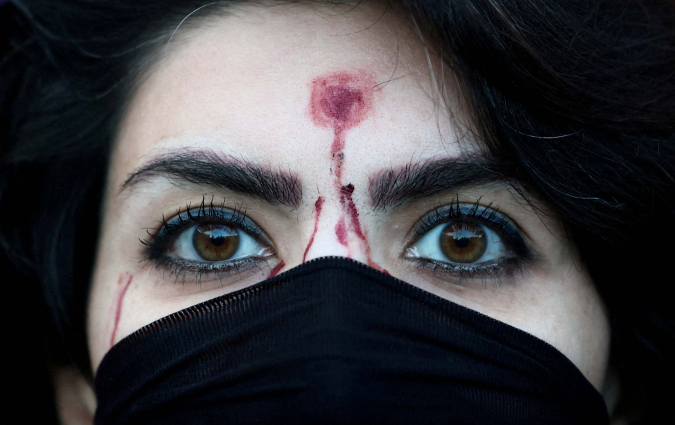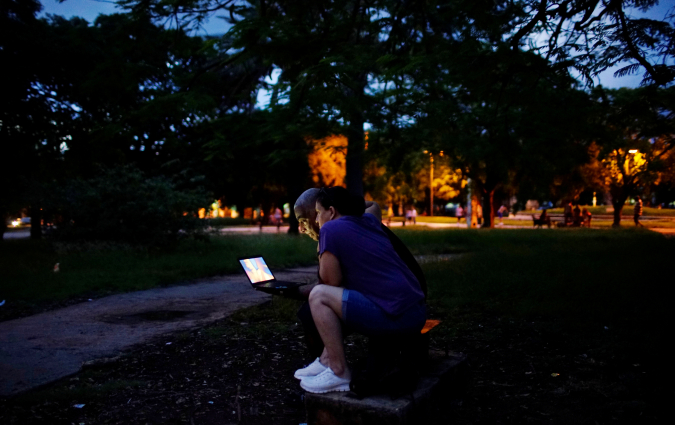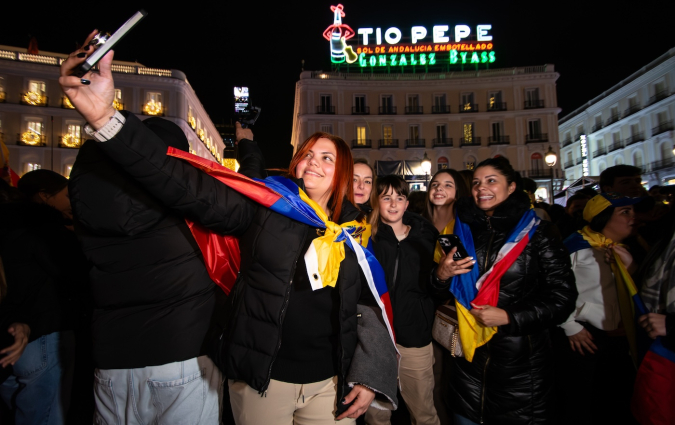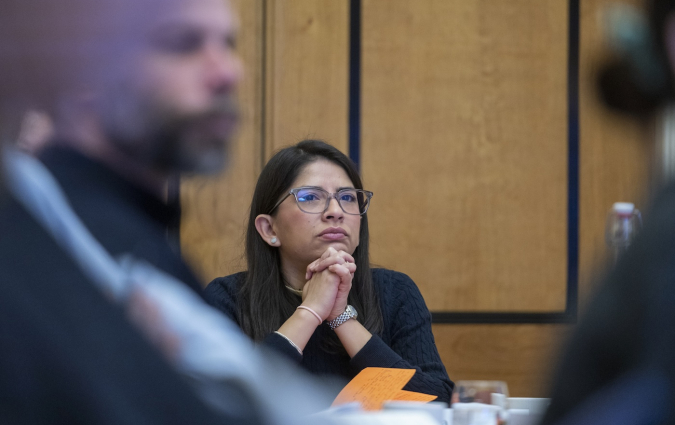“You need to choose your words carefully”: How reporters in Burkina Faso keep reporting under attack
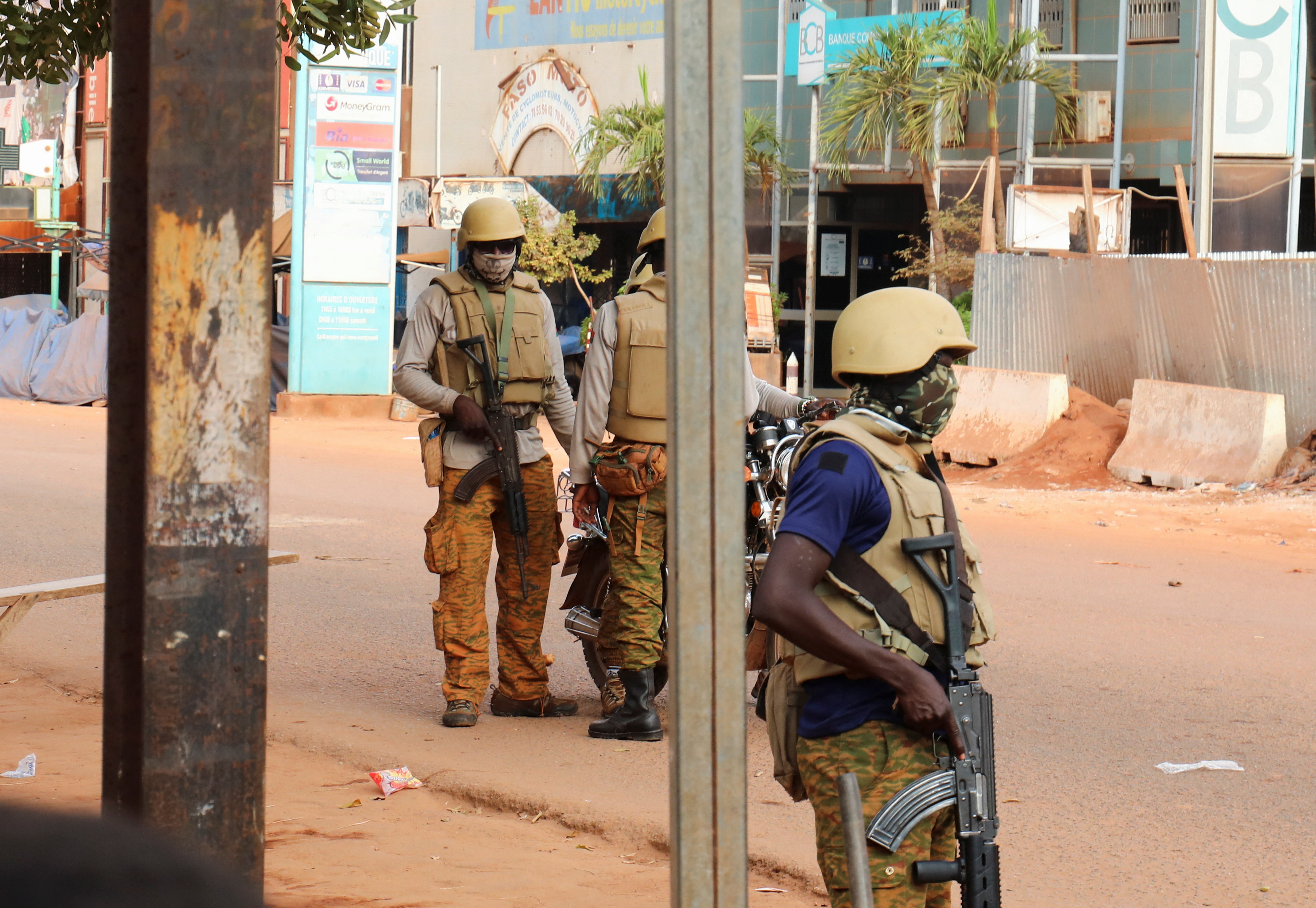
New junta's soldiers stand guard in a street of Ouagadougou, Burkina Faso October 1, 2022. REUTERS/Vincent Bado
Two female French journalists were expelled from Burkina Faso in 2023. Sophie Douce from Le Monde and Agnès Faivre from Libération were given 24 hours to leave the country a few days after they reported on a video allegedly filmed at a military base.
The clip showed bodies of children on the ground with men at the scene wearing apparent uniforms from the country’s military. Authorities in Burkina Faso described their reports as manipulation disguised as journalism.
Douce’s and Faivre’s expulsions are just one amongst many examples of the decline of press freedom in Burkina Faso since the military takeover in September 2022. Interim President Paul-Henri Sandago Damiba was removed over his perceived inability to deal with Islamist insurgency in the country. Captain Ibrahim Traoré, who led the coup, took over as interim leader and has been in charge ever since.
Jonathan Rozen, Africa senior researcher at the Committee to Protect Journalists (CPJ), told me that foreign journalists, notably those from France, have been under increased pressure and scrutiny since the military coup. Burkina Faso is a Francophone country with a large presence of French media outlets and reporters.
“Journalists working in Burkina Faso face a combination of challenges, including security concerns associated with armed groups operating in the country and restrictions on what the military authorities deem acceptable coverage,” Rozen said.
He explained Douce’s and Faivre’s expulsions followed the suspensions of French broadcasters France 24 and Radio France Internationale over coverage of security issues in the region. “Burkina Faso’s media regulator suspended a third French broadcaster, La Chaîne Info (LCI), over its coverage of the local security situation,” Rozen said.
A dangerous decline
The country is now ranked 86th on Reporters without Borders (RSF) Press Freedom Index, down from 58th in 2023. Since taking power, the military junta has suspended media outlets and deported several foreign journalists such as Douce and Faivre.
In August 2023 authorities indefinitely suspended Radio Oméga over an interview with a spokesperson for a group committed to reinstating Niger President Mohamed Bazoum, who was ousted by soldiers in a coup on 26 July. Burkina Faso’s government described the interview as “peppered with insulting remarks against the new authorities.”
Over a year period, at least four journalists disappeared in the country.
Boukari Ouoba, the secretary of the journalism association in Burkina Faso, told me the situation in the country looks increasingly bad for journalists and other media workers.
“Press freedom has been deteriorating since at least since 2020 due to insecurity. But from 2021 the deterioration is largely due to successive political powers,” he said. “The political pinnacle of danger was reached with two military coups that took place in 2022.”
According to Ouoba, journalists live in constant fear today. “Hate speech is frequently used against opinion leaders and journalists are treated by those in power as being stateless people,” he said. The country’s leader, Captain Ibrahim Traoré, even announced he is ready to shut down media outlets that do not go in his direction.
Arnaud Ouedraogo, coordinator of CENOZO, a Burkina Faso-based investigative journalism nonprofit, said being a journalist in the country is now more stressful than ever before. “Subjects are no longer treated with ease, especially questions related to terrorist attacks and the military power in place,” said Ouedraogo, whose organisation has often come under attack.
He explains that critical journalists are often subjected to denigration campaigns on social media and many are tempted to observe self-censorship as a result. “Threats of suspension or intimidation of all kinds impact our journalism,” Ouedraogo said. “There are fewer in-depth treatments of topics of interest. Our true role as journalists should be to point out dysfunctions, so that solutions can be found.”
Ouedrago said foreign journalists working in Burkina Faso are treated in the same way as local journalists: “The only difference is that local journalists can’t be expelled.”
“Choose your words carefully”
Burkina Faso has a dynamic media landscape, according to RSF, with over 80 newspapers, 185 radio stations, 30 TV channels and more than 100 digital news sites operating in the country. Alongside government-controlled media outlets, several independent publications and digital news outlets are springing up. Investigative outfit CENOZO, the newspaper L'Événement and independent news site Bam Yinga are some of these media outlets.
However, the media environment is increasingly dangerous and the government has even enlisted journalists from these outlets forcibly to fight in the army despite opposition from press freedom groups.
Hyacinthe Sanou, a journalist with Studio Yafa, a company producing audio, video and multimedia programs for young people, told me that you need to choose your words carefully when reporting on the country’s situation.
“It’s like having the sword of Damocles hovering over our heads,” he said. “The angle of your article, your sources, your conclusions – everything must be chosen with great care to avoid being expelled.”
Sanou said it has become difficult to work as a journalist in the country. “The noose is tightening around press freedom and this has repercussions on our work,” he said. “The threat doesn’t come so much from the government but from some of their zealous supporters. You don’t know where the negative reaction will come from and in what form.”
For Ouoba the impact of this decline in press freedom is difficult to estimate. “There’s an unprecedented level of self-censorship,” he said. “Certain journalists and media houses are constantly attacked, especially on social media. They try to stifle our voices by developing a network of trolls who pollute the information environment and discredit professional journalists.”
Edzozi Ahiadou, Africa programme officer at the Vienna-based International Press Institute, said this pervading atmosphere of fear is “the greatest danger for press freedom” in the country.
Sanou, the journalist from Studio Yafa, said he’s been personally attacked by the authorities and labelled as a spy for a French nonprofit the government doesn’t like. “Every word was false. The news came out the day after I spoke in a meeting where I said that journalists should be allowed to do their work freely without attacks or interference,” he said.
Ouoba, the secretary of the journalism association, said he was accused alongside two other colleagues of helping Libération’s Agnès Faivre to carry out her investigation into alleged human rights violations.
“For those who don’t know me, that information immediately makes me a public enemy and a ‘stateless person’ in league with the enemies of my own country,” he said. “I went through a very difficult time for a month or so, and I’m sure my colleagues went through a very hard time too.”
Increasing advocacy and safety tips
Ahiadou said the IPI has been vigorously engaging journalists in the country and calling on the military authorities to abide by principles of press freedom. “The fight against terrorism should not be a pretext to repress criticism and undermine journalists and news organisations,” he said.
CPJ’s Rozen said his organisation continues to monitor the press freedom environment in Burkina Faso, documenting issues and engaging with the authorities. He pointed to CPJ’s safety resources as a good place to prepare before an assignment.
He advised foreign journalists in the country to consult with local journalists because they know the landscape well. “They know which places to avoid and any other risks associated with reporting on sensitive issues,” he said. “It’s key to understand the laws, including the penal code, which the government amended in 2019 to restrict reporting on militant activity.”
Forging ahead
Despite these challenges, journalists in the country are still forging ahead with their reporting.
Ouedraogo from CENOZO said the situation remained very complex and recommended that journalists, including foreign reporters coming to the country, take adequate precautions such as knowing their environments, connecting with local reporters and respecting the rules and ethics of journalism.
“This will help to avoid any obvious errors that may lead to lawsuits or arrests by the military authorities,” he said.
CENOZO, alongside 30 other media organisations from Senegal, France, Ghana, Austria, signed an open letter for the protection of journalists and the defense of freedom of expression and freedom of the press in Mali and Burkina Faso. The letter was addressed to the leaders at the United Nations, ECOWAS, and the African Union.
In every email we send you'll find original reporting, evidence-based insights, online seminars and readings curated from 100s of sources - all in 5 minutes.
- Twice a week
- More than 20,000 people receive it
- Unsubscribe any time
signup block
In every email we send you'll find original reporting, evidence-based insights, online seminars and readings curated from 100s of sources - all in 5 minutes.
- Twice a week
- More than 20,000 people receive it
- Unsubscribe any time


